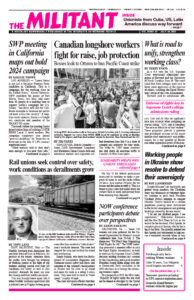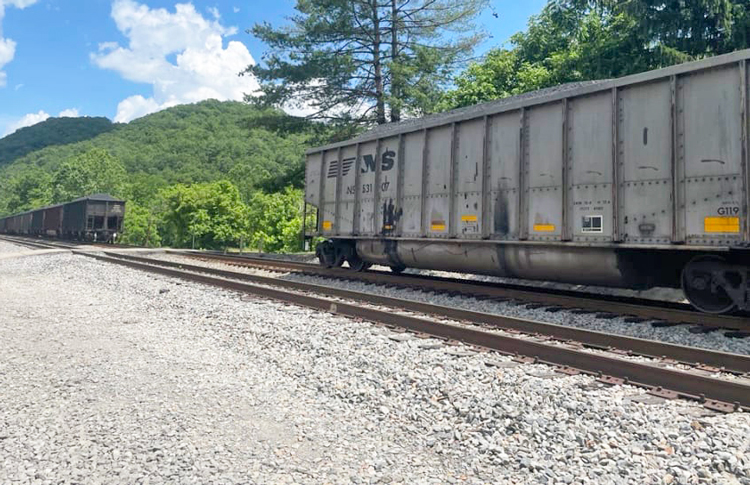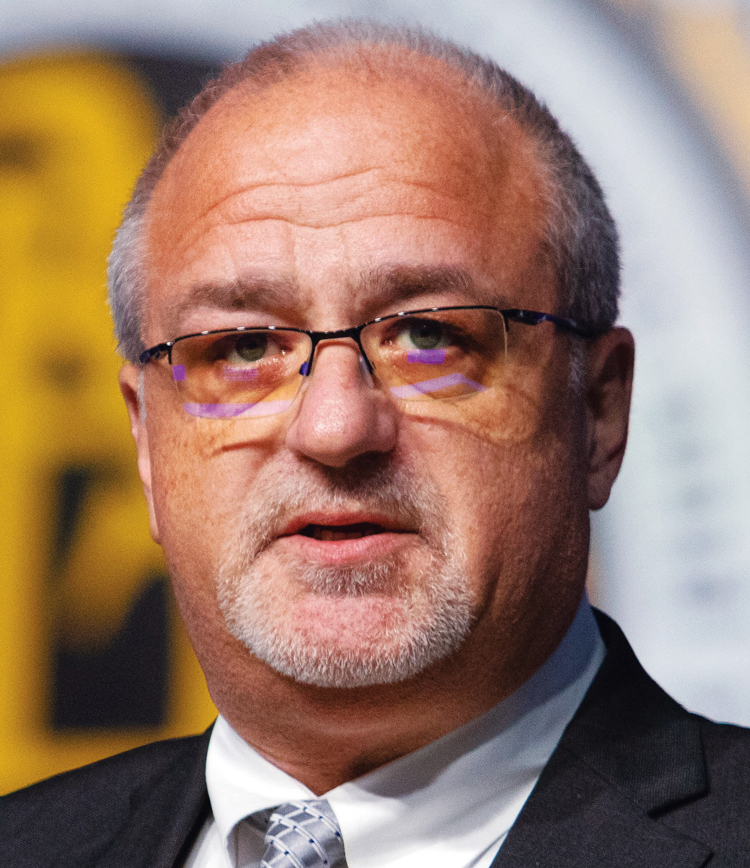EAST PALESTINE, Ohio — The Norfolk Southern train derailment, fire and toxic burn-off here in February, the product of the bosses’ relentless drive for profits, have brought the attention of working people to the fight of rail workers seeking control over their job conditions and safety, as well as area residents’ demands for more say over the cleanup and their health care needs.
That was brought home again July 6 when Norfolk Southern supervisors told a railroad crew in Virginia to keep going even after they received a “critical alert” over a trackside detector. The crew had stopped the train and verified the wheel was overheating.
Randy Fannon, who leads the Brotherhood of Locomotive Engineers and Trainmen union’s safety task force, said someone at the railroad’s headquarters in Atlanta told the crew to go ahead and move the train to a siding 8 miles away. They were told to travel at “track speed,” roughly 40 mph.
The crew told union officials that they weren’t comfortable with going that fast, so they kept the speed at around 20 mph. But 19 cars on the train still derailed.
“We’re just lucky right now that it’s coal,” Fannon said. “If it had been ethanol or LP gas or chlorine or anything like that, it could have been a totally different situation.”
A Norfolk Southern spokesperson told the press, “This derailment should never have happened. It is unacceptable. We are working to achieve our goal of being the gold standard for safety in the railroad industry, and this incident strengthens our resolve.”
The National Transportation Safety Board announced the next day that they were opening an investigation. Fannon made his comments before this announcement. Union officials and company representatives are not supposed to speak on NTSB investigations until the agency releases its findings.
This new investigation comes on top of two probes into Norfolk Southern’s responsibilities in the East Palestine disaster.
Norfolk Southern bosses themselves moved June 30 to try and foist some of the cost of the East Palestine derailment onto Union Tank Car Company, which built the tank cars that contained vinyl chloride; three companies that owned or leased them; Oxy Vinyls, which manufactured and loaded the toxic gas; and Dow Chemical, which made and loaded other dangerous chemicals that leaked in the town’s air, water and soil.
Oxy Vinyls denied responsibility. “Norfolk Southern’s lawsuit is a meritless disinformation campaign masquerading as a legal filing,” a company spokesperson responded. “Norfolk Southern’s recommendation to simultaneously detonate the rail cars containing our product — contrary to the available information about the rail cars’ condition or the product properties — appears to have been needlessly rushed to prioritize Norfolk Southern’s rail line operations.”
Details about this were brought out by rail union officials at the NTSB hearings here June 22-23. Oxy Vinyls had urged Norfolk Southern not to pursue the uncontrolled burn-off of their product, but Norfolk Southern bosses didn’t give this information to anyone else.
For government-funded health care
Working people in and around East Palestine are fighting to get the assistance and health care they need in the wake of the derailment. The Unity Council for the East Palestine Train Derailment has been demanding Ohio Gov. Michael DeWine press President Joseph Biden to issue a formal declaration of a disaster here. After months of pressure, DeWine did so July 3.
“Why did it take so long?” Jami Wallace, president of the Unity Council, told the Militant. “It’s more than five months since the derailment. And more importantly, in the letter he makes it seem like we have been taken good care of by Norfolk Southern. Absolutely not true. I’m still fighting to get the water that seeps into my basement tested and to get them to check the town’s storm drains. After the heavy rain we had, the chemical sheen on Sulphur Run creek came back.”
Wallace also raised some of the problems they’ve had with local authorities. “We were going door to door early on to talk to those in their homes about their health problems and needs. We were told that a city ordinance forbids canvassing.”
Hilary Flint, vice president of the council and a resident of Enon Valley, Pennsylvania, joined a July 6 solidarity rally in Pittsburgh for the United Electrical Workers members on strike against the Wabtec corporation in Erie. “I see a synergy between our fight in East Palestine against Norfolk Southern railroad’s disruption of our lives and the demands that the workers at Wabtec are fighting for,” she told the Militant. “I’m pro-union in general and we need the unions in our fight.
“At the rally I was asked to speak at a meeting of the Beaver-Lawrence Central Labor Council about our continued fight.” She added there is a protest planned in East Palestine Aug. 3 to mark six months since the derailment.
East Palestine resident Jessica Conard told the Vindicator, the Youngstown, Ohio, paper, that a presidential disaster declaration could open the door for people here “to take advantage of Social Security 1811A for long-term health needs.” The paper reported there will be a March for Medicare for All at the Columbiana County Courthouse July 22 to press for the act’s implementation.
Unions push for more training
One part of the National Transportation Safety Board’s investigation is to look at Norfolk Southern’s “safety culture.” Prior to the recent NTSB hearings here, board officials did an interview with a number of rail union members that paints a graphic picture of the rail bosses’ disdain for training new employees.
Tim Sloper, legislative representative for SMART — Transportation Division Local 768, said that when he hired on in 1999, he had an initial conductor training period of six to eight weeks. After that, “I trained on my one single district, which was between Decatur and Moberly, Missouri; it’s a 211-mile run. I trained on that district for five months before I was promoted to conductor.”
“I was assigned to a specific conductor so that every time that I went to work, that conductor knew what I knew and what I didn’t know and so each trip he could teach me something new,” he said, “and then, over the course of my five months, when I was promoted, he knew that I was ready to go out there and work on the train by myself.”
Today trainees get three weeks of training in Norfolk Southern’s Georgia office and then get sent out into the field. “Conductor trainees go with a different conductor every single trip,” Sloper said. “There’s just no relationship built there to foster a productive learning environment.”
In June, the Federal Railroad Administration demanded Norfolk Southern implement immediate changes in its conductor trainee program, saying it suffers from “grave deficiencies” that have included “amputations and other serious injuries.”
Twenty-eight-year-old Derek Scott Little, a CSX conductor trainee just days away from being “marked up,” was killed on the job June 26 at the Seagirt Marine Terminal in Baltimore. The SMART union has announced an online fundraiser for his family. More than 40 rail workers died on the job last year.
This underscores the need for the rail unions to fight and win control over training and work conditions.



